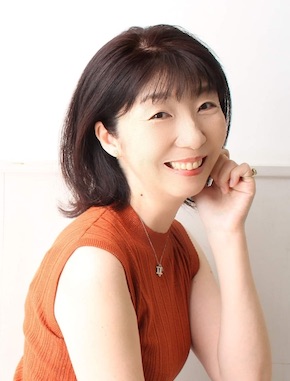Something to dream about
by Michiko Aoyama
The library at the end of the passageway is larger than I expected, with rows and rows of bookshelves lining the walls and central area. Apart from a girl in a navy-blue apron behind the counter, who is scanning barcodes on books, there is nobody else in there as far as I can tell.
I browse through the shelves along the wall closest to the door. As the Community House is located so close to an elementary school, I assumed its collection would be weighted towards a juvenile readership, but am surprised to discover that the range of books is equal to that of any standard library.
I look for books about antiques and quickly find them in the arts-and-crafts section. After flipping through a few, I decide to look for books on how to open a shop. The girl in the apron walks past with several books in her hands. Reshelving them, I expect.
‘Excuse me, do you have anything about business start-ups and management?’ I ask her.
She looks startled. ‘Er, um… That would be in business, maybe. But biographies of business people might be useful too.’
The name on her badge is Nozomi Morinaga. She looks like a teenager still, and is trying so hard to think, I feel bad. ‘Oh, don’t worry about it,’ I reassure her, dismissing my request with a wave of my hand.
Nozomi’s face turns bright red. ‘I’m sorry. I’m still a trainee. But there’s a librarian in the reference section at the back who you can consult.’
In the direction she points I see there is a sign with the word ‘Reference’ on it, hanging from the ceiling. This library might be small, but having a professional librarian is a sign that it is no tinpot facility.
When I make my way to the back and peer over the partition at the reference desk on the other side, I do a double take. Sitting behind the desk is a large woman. By large, I mean very large. Her head rests on top of a body that looks like it is on the verge of bursting, with no neck visible in between. She wears a beige apron and a loose-knit ivory cardigan, and her skin is ghostly pale. She reminds me of the Stay-Puft Marshmallow Man in Ghostbusters.
I approach with care. The expression on Stay-Puft’s face is dour – I can see her body is quivering faintly. Is she not well? When I glance down at her hands, I notice them moving busily behind the counter, stabbing with a needle at some kind of round object. What on earth is she doing? Some kind of stress-relief exercise, perhaps?
Still in two minds as to whether to speak to her or not, I’m about to turn on my heel when she lifts her head. Our eyes meet unexpectedly, and I freeze.
‘What are you looking for?’
Her voice is uncanny. Gentle, with an underlying note of tenderness that is most unexpected in that unsmiling face. My feet move unsteadily towards her, as if of their own accord.
What are you looking for? she had asked me.
I think about it. A place for these dreams that I don’t know what to do with?
The name badge on Stay-Puft’s chest says ‘Sayuri Komachi’. All right, I shall call her Ms Komachi. I observe a floral ornamental hairpin speared through the bun on her head.
‘Er… do you have any books about starting a business?’
‘Starting a business,’ she repeats.
Hearing her repeat my words makes them sound grand, as if I’m thinking about embarking on some really impressive project. Sheepishly, I follow up with another request. ‘And also something with tips on how to successfully resign from a job.’ Not that I’ll ever be able to start a business or quit my job.
The days go by more happily when you have something to dream about. It’s not always a bad thing to have a dream, with no plan for ever carrying it out.”
Ms Komachi places the needle and round object in an orange cardboard box, which I recognize as a Kuremiyado Honeydome cookie box. I used to be given these as a reward for helping at home when I was a kid.
She puts the lid on and looks at me. ‘There are many types of business. What is it you want to do?’
‘I want to own my own antiques shop one day.’
‘One day.’
Once again, she repeats a single phrase of mine in a flat tone.
‘Well, of course I can’t quit my job any time soon,’ I say quickly, feeling the need to justify myself. ‘And securing the funding to open a shop won’t be easy. But the more I say “one day” the more I feel like it might only ever be a dream.’
‘Only ever a dream…’ She tilts her head to one side inquiringly. ‘Is that what you think? That it will only ever be a dream? As long as you continue to say the words “one day”, the dream is not over. Maybe it will simply remain a beautiful dream. It may never come true. But that is one way to live, in my opinion. The days go by more happily when you have something to dream about. It’s not always a bad thing to have a dream, with no plan for ever carrying it out.’
I am lost for words. If ‘one day’ are magic words that keep a dream alive, what do I need to say to make it real?
‘But if you need to know what lies beyond the dream, you need to know.’
Without warning Ms Komachi sits ramrod straight in her seat and turns to face the computer screen. For a split second she holds her fingers above the keyboard, and then, without preamble, launches into a high-speed blitz on it. Her fingers move so fast they are a blur. I can only gape in astonishment. Finally, with a single flamboyant flourish she hits the return key and a piece of paper begins to emerge from the printer.
I scan the sheet she hands to me. It is a table of book titles with the author names and shelf numbers: You Too Can Open a Store, My Store, Seven Things You Should Do Before Quitting Your Job. The last one on the list, however, is one I have to read twice: Royal Horticultural Society: How Do Worms Work? A Gardener’s Collection of Curious Questions and Astonishing Answers.
Surely this is a mistake. I read the full title aloud. Softly, but loud enough for her to hear. Ms Komachi, however, gives no reaction and continues to regard me.
‘How Do Worms Work?’ I repeat.
‘Uh-huh.’ She pats her hairpin. ‘Incidentally, this flower is acacia.’
How am I supposed to respond to this? ‘It’s lovely,’ I reply.
She taps on the lid of the Honeydome box with an index finger. I glance at the picture of a white flower on it and the penny drops. The flower on the Honeydome box is acacia. How is it that I’ve seen this box numerous times before but never thought about what type of flower that is?
‘The honey in Honeydome cookies comes from acacia flowers,’ she murmurs. Then she folds her large body over to reach down and open the second drawer under the counter.
‘And for you – this one. Please, take it.’ She holds out a hand like a lightly squashed cream bun. I automatically stretch mine out in return and feel something soft and light on my palm. It is a woollen ball that looks like… a cat? A cat with a brown body and black stripes, sleeping on its side. A brown mackerel tabby.
‘Um, what’s this for?’
‘It’s a free gift.’
‘Excuse me?’
‘A free gift, a bonus to go with the books.’
A bonus? And what had she been implying when she said, ‘And for you’? Do I look like a cat lover? Why?
‘These are really so easy to make. You don’t need a pattern. And you don’t have to make an exact copy of anything,’ she tells me and, with this, opens the lid of the Honeydome box, takes out the needle and ball of wool, and once more begins to plunge the needle in and out. This feels to me like a signal that my time is up. No more questions. I turn to leave, with the sheet of paper and cat in hand.
‘Oh, and one more thing,’ she says, not looking up. ‘When you go, don’t forget to record the time of your departure in the visitors’ log on the front counter. So many people forget to do that.’
‘Ah, yes, of course.’
Prick, prick, prick goes the needle as she jabs it with regular precision, in and out, in and out, her Stay-Puft body quivering with fine vibrations in time with each jab.
from What You Are Looking For Is in the Library (Doubleday, £12.99)
—
Michiko Aoyama was born in 1970 in Aichi Prefecture, Japan and now lives in Yokohama. After graduating from university, she worked for two years as a reporter for a Japanese newspaper based in Sydney before moving back to Japan to work as a magazine editor. What You Are Looking For Is in the Library was shortlisted for the Japan Booksellers’ Award, became a Japanese bestseller, and is being translated into more than twenty languages. The English-language edition, translated by Alison Watts, is published by Doubleday and Transworld Digital in hardback, eBook and audio download.
Read more
@DoubledayUK
Alison Watts’ previous translations include The Boy and the Dog by Seishu Hase and Sweet Bean Paste by Durian Sukegawa, as well as novels by Naoki Matayoshi and Riku Onda.
alisonwattstranslator.weebly.com


